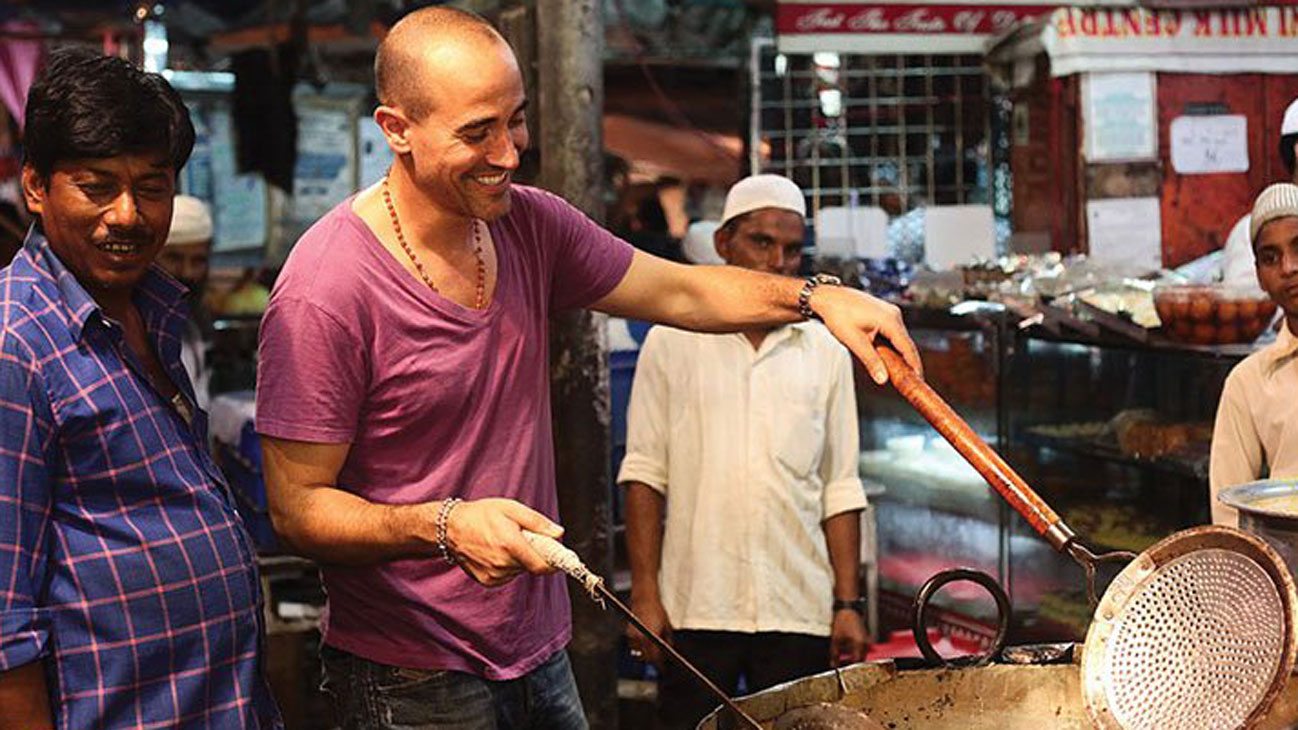Celebrity chef David Rocco brings his passion for food and healthy cooking to millions of kitchens every day through his worldwide hit television programs David Rocco’s Dolce Vita, David Rocco’s Amalfi Getaway, and his newest program, David Rocco’s Dolce India. He is also the author of two internationally bestselling cookbooks. Lending his wit, charm, and charisma to everything he does–whether hosting a unique event or overseeing a corporate cook-off, appearing at a charity gala, or endorsing a brand–whatever David is involved with, it’s sure to be fantastico! David is currently in India, taping the second season of Dolce India. The Hindu Times caught up with him to talk about his experience in the country so far:
His beloved pasta has got curried and the tiramisu ‘coconutty’. But David Rocco, anchor and executive producer of Dolce India, a programme that showcases the wealth of Indian cuisine and the diversity of its culture, is excited about such innovative crossovers.
He says with conviction that he is more Indian than most, and you got to agree. For this Canadian of Italian origin has been romancing the country with umpteen trips to different Indian cities, discovering their food and life. David was in Kochi shooting for Season 2 of the programme to be aired early next year, enjoying every bite of the differently done classics.
Bringing India to the world through the plurality of its cuisine can be a difficult story to narrate but David has chosen to go beyond the country’s stereotyped culinary image of chicken tikka masala and thali meals.
“I see myself as an ambassador of India; I take my role very seriously. It is a huge responsibility. I have to depict India in proper light, full of contradictions, which is a good thing. As a producer I don’t want to get into the trap of a clichéd image of India as a land of saris and turbans. India is a progressive country.”
For this true telling David did recee runs to the country many times and learnt over the course of his travels and exchanges about the country’s multifaceted culture and resultant cuisines.
But David is no chef and holds no degrees in the field. So how is he wielding the ladle? “I am the good Italian boy who has carefully watched his grandmother and mother cook in the kitchen. It comes from a love for food, a passion. I don’t work a day in my life,” says David who on work prepares, shares and learns all about foods of different lands.
This season will see a more matured David, with 22 months of the India experience behind him. The first season was a culinary journey and he learnt, as they say, on the job.
“I knew nothing, I was raw and vulnerable. I cooked Italian and mixed it up.” This time round he is getting into family recipes and working with the top chefs sourcing from them tips and secrets.
A great one for experimenting and tweaking ingredients to create his version of a recipe David holds the authenticity of ingredients prime. “The ingredient is sacrosanct but cooking is creative,” he says.
This show travels from Goa through Kollam, Fort Kochi, to Kolkata, Srinagar and then parts of Delhi.
Kerala threw up wonderful surprises for him, like beef on the menu. He made his version of spaghetti and beef. With fishermen at the Chinese nets, who prepared appam and egg roast David dished out spaghetti with calamari. “It’s all about local food done my way,” he says.
Going beyond cooking, he taught the fishermen to eat spaghetti, al dente, which they found undercooked or raw! It’s in these cultural exchanges that Dolce India draws the viewer in, he affirms.
His version of Kerala style mullet curry has toddy and curry leaf garnish, something not approved by his local guide but on tasting it she had to eat her words, he discloses.
The Portuguese influence traced in the feted Goan vindaloo and the culinary mish-mash of history cuisine of Fort Kochi, collated interestingly by Chef Ajeeth of Brunton Boatyard, find prime time in David’s explorations. “It’s interesting how cosmopolitan a small area like Fort Kochi can be. What stood out for me is its simplicity and complexity, simple assemblage but layers of flavours.”
How is his equation with spice? David likes it hot and spicy. “He who controls the spice, controls the kitchen,” he thunders playing every bit the role of a charming anchor.
It was filmmaking that drew David into the field. Ten years ago his wife suggested that they do a film on global cuisines. And that’s how this journey, the Dolce Vita Series, a voyage of culinary discovery began.
India has had its peculiar influence on him. It has opened his mind, he believes. When he cuts his finger, he applies turmeric, the Indian way. He knows mace is a must in biriyani. “I think I have been an Indian all my life,” he says turning a bit philosophical, speaking about being blessed with a happy family with three kids, of how his twin girls discovered the sari and kurta after they visited India.
Now that he knows the sense of spice and understands the spluttering of mustard, now that coconut oil is not foreign to him, he still has to make peace with the Indian desserts.
“No Indian sweets, they are too sweet,” he says.
But the sweetness of India, Dolce India has him by his heart. He says, “I think Mother India is going to be nice to me. I will be back.”

